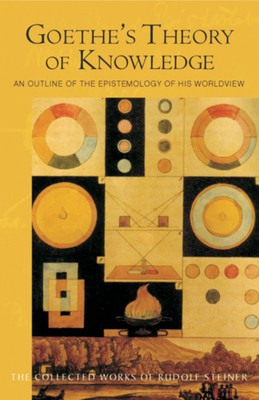
- We will send in 10–14 business days.
- Author: Rudolf Steiner
- Publisher: STEINER BOOKS
- ISBN-10: 0880106239
- ISBN-13: 9780880106238
- Format: 15.2 x 22.9 x 1.8 cm, minkšti viršeliai
- Language: English
- SAVE -10% with code: EXTRA
Reviews
Description
Written 1884-1885; first published 1886 (CW 2)
As the editor of Goethe's scientific writings during the 1880s, Rudolf Steiner became immersed in a worldview that paralleled and amplified his own views in relation to epistemology, the interface between science and philosophy, the theory of how we know the world and ourselves. At the time, like much of the thinking today and the foundation of modern natural science, the predominant theories held that individual knowledge is limited to thinking that reflects objective, sensory perception. Steiner's view was eventually distilled in his Anthroposophical Leading Thoughts in 1924: "There are those who believe that, with the limits of knowledge derived from sensory perception, the limits of all insight are given. Yet if they would carefully observe how they become conscious of these limits, they would find in the very consciousness of the limits the faculties to transcend them."
In this concise volume, Steiner lays out his argument for this view and, moreover, begins his explication of how one goes beyond thinking to the observation of thinking itself.
Goethe's Theory of Knowledge is essential reading for a deeper understanding of Rudolf Steiner's seminal work, Intuitive Thinking as a Spiritual Path: A Philosophy of Freedom.
CONTENTS:
Introduction by Christopher Bamford
Preface to the Edition of 1924 by Rudolf Steiner
Foreword to the First Edition (1886) by Rudolf Steiner
A. Preliminary Questions
1. The Point of Departure
2. Goethe's Science According to Schiller's Method
3. The Purpose of Our Science
B. Experience
4. Establishing the Concept of Experience
5. Examining the Essence of Experience
6. Correcting the Erroneous View of Experience as a Totality
7. The Experience of Each Individual Reader
C. Thinking
8. Thinking as a Higher Experience within Experience
9. Thinking and Consciousness
10. The Inner Nature of Thinking
D. Knowledge
11. Thought and Perception
12. Intellect and Reason
13. The Act of Cognition
14. Cognition and the Ultimate Ground of Things
E. Knowing Nature
15. Inorganic Nature
16. Organic Nature
F. The Humanities
17. Introduction: Mind and Nature
18. Psychological Cognition
19. Human Freedom
20. Optimism and Pessimism
G. Conclusion
21. Knowledge and Artistic Creation
Notes to the First Edition [1886]
Annotations to the Edition of 1924
This volume is a translation from the German of Grundlinien einer Erkenntnistheorie der Goetheschen Weltanschauung, mit besonderer Rücksicht auf Schiller (GA 2). Previous translations were published as The Science of Knowing (1988) and The Theory of Knowledge implicit in Goethe's World-Conception: Fundamental Outlines with Special Reference to Schiller (1940).
- Author: Rudolf Steiner
- Publisher: STEINER BOOKS
- ISBN-10: 0880106239
- ISBN-13: 9780880106238
- Format: 15.2 x 22.9 x 1.8 cm, minkšti viršeliai
- Language: English English
Written 1884-1885; first published 1886 (CW 2)
As the editor of Goethe's scientific writings during the 1880s, Rudolf Steiner became immersed in a worldview that paralleled and amplified his own views in relation to epistemology, the interface between science and philosophy, the theory of how we know the world and ourselves. At the time, like much of the thinking today and the foundation of modern natural science, the predominant theories held that individual knowledge is limited to thinking that reflects objective, sensory perception. Steiner's view was eventually distilled in his Anthroposophical Leading Thoughts in 1924: "There are those who believe that, with the limits of knowledge derived from sensory perception, the limits of all insight are given. Yet if they would carefully observe how they become conscious of these limits, they would find in the very consciousness of the limits the faculties to transcend them."
In this concise volume, Steiner lays out his argument for this view and, moreover, begins his explication of how one goes beyond thinking to the observation of thinking itself.
Goethe's Theory of Knowledge is essential reading for a deeper understanding of Rudolf Steiner's seminal work, Intuitive Thinking as a Spiritual Path: A Philosophy of Freedom.
CONTENTS:
Introduction by Christopher Bamford
Preface to the Edition of 1924 by Rudolf Steiner
Foreword to the First Edition (1886) by Rudolf Steiner
A. Preliminary Questions
1. The Point of Departure
2. Goethe's Science According to Schiller's Method
3. The Purpose of Our Science
B. Experience
4. Establishing the Concept of Experience
5. Examining the Essence of Experience
6. Correcting the Erroneous View of Experience as a Totality
7. The Experience of Each Individual Reader
C. Thinking
8. Thinking as a Higher Experience within Experience
9. Thinking and Consciousness
10. The Inner Nature of Thinking
D. Knowledge
11. Thought and Perception
12. Intellect and Reason
13. The Act of Cognition
14. Cognition and the Ultimate Ground of Things
E. Knowing Nature
15. Inorganic Nature
16. Organic Nature
F. The Humanities
17. Introduction: Mind and Nature
18. Psychological Cognition
19. Human Freedom
20. Optimism and Pessimism
G. Conclusion
21. Knowledge and Artistic Creation
Notes to the First Edition [1886]
Annotations to the Edition of 1924
This volume is a translation from the German of Grundlinien einer Erkenntnistheorie der Goetheschen Weltanschauung, mit besonderer Rücksicht auf Schiller (GA 2). Previous translations were published as The Science of Knowing (1988) and The Theory of Knowledge implicit in Goethe's World-Conception: Fundamental Outlines with Special Reference to Schiller (1940).


Reviews